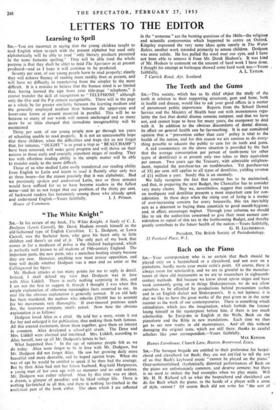"The White Knight"
S1R,—In his review of my book, The White Knight, A Study of C. L. Dodgson (Lewis Carroll), Mr. Derek Hudson reveals himself as the old-fashioned type of English Carrollian. C. L. Dodgson, or Lewis Carroll, was the bachelor born, who gave his heart only to little children and there's an end of ,it. The only part of my book that comes in for a modicum of praise is the Oxford background, which is perfectly well known to all students of 19th-century England. The important parts, the new parts, take a merciless beating simply because they are new. However, anything new must arouse opposition, and time will decide whether Dodgson was a man and an artist or the Collingwood lay figure.
Mr. Hudson attacks at too many points for me to reply in detail. Instead, I shall defend my view that Dodgson was in love with Alice Liddell. There is really nothing surprising in this, and I am not the first to suggest it, though I thought I was when this simple explanation of otherwise meaningless facts occurred to me. In real life the obvious explanation is generally correct. If an old lady has been murdered, the nephew who inherits £50,000 has to account for his movements very thoroughly. If over-insured premises catch fire, the insurance company smells petrol. Now here the obvious explanation is as follows:
Dodgson loved Alice as a child. He told her a story, wrote it out for her and enlarged it for publication, thus making them both famous. All this created excitement, threw them together, gave them an interest in common. Alice developed a school-girl crush. The Dean and Mrs. Liddell were alarmed and interfered. Mrs. Liddell, according to Alice herself, tore up all Mr. Dodgson's letters to her.
What happened then ? In the age of reticence people felt as we do today. Alice soon forgot to be in love with Mr. Dodgson, but Mr. Dodgson did not forget Alice. He saw her growing daily more beautiful and more desirable, and he hoped against hope. When she was of age he would be entitled to speak if he then had the courage. But by then Alice had met her future husband, Reginald Hargreaves, a young man of her own age with no stammer and no odd notions. Mr. Dodgson was rather relieved. Alice by this time was an ideal, a dream, a glimpse of paradise; and he liked college life. There is nothing far-fetched in all this, and there is nothing far-fetched in the analytical part of the book either. The ideas which 1 see reflected in the " nonsense " are the burning questions of the 1860s—the religious and scientific controversies which happened to centre on Oxford. Kingsley expressed the very same ideas quite openly in The Water Babies, another work intended primarily to amuse children. Dodgson was more subtle. He has pulled the wool over our eyes, and 1 have not been able to remove it from Mr. Derek Hudson's. It was kind of Mr. Hudson to comment on the amount of hard work I have done. I thought his attempt at burlesque showed some hard work too.—Yours


































 Previous page
Previous page